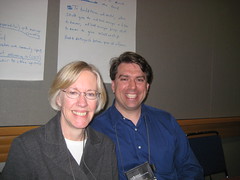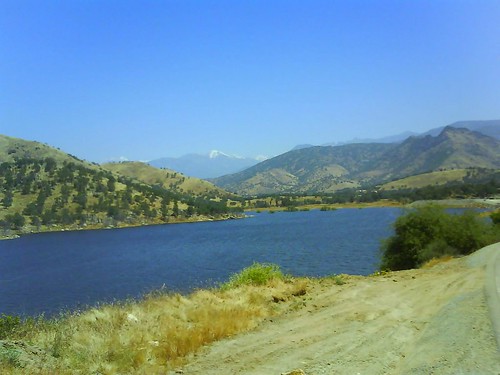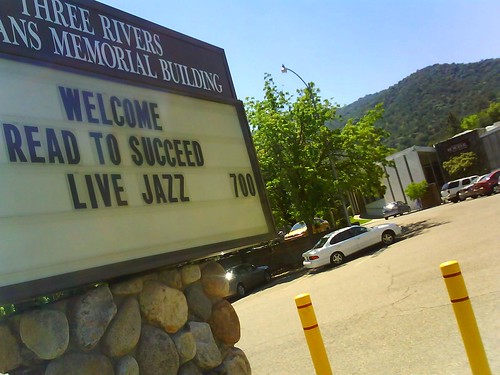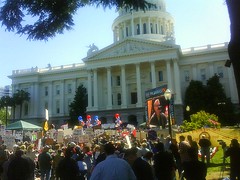Now that the dust has settled from the Post-ALA posts, I thought it would be safe to share some of my experiences while I was there. This will be one of a series of posts that will report what I did during ALA and what I learned.
This first post will cover my experience on the exhibit floor.
The ALA exhibit hall was massive. There were over 3,000 different booths to choose from. The ALA exhibit guide was very helpful as I was able to plan out where I needed to go.
My mission was to hit the exhibits of vendors I was interested in purchasing from. There are several issues at my library and I was looking for solutions that solved ongoing problems with one time costs.
Demco Gaming BoothWe received an LSTA grant from the Arizona State Library Archives and Public Records for teen gaming. I have previously established a contact with Best Buy government services so that I can acquire the equipment. However, it would be easier if I can order some of the materials from existing vendors.
As a result, I headed over to the Demco Gaming booth. They had Guitar Hero going with a complete set-up. They had a boom chair, a Wii gaming system with a console that can store and lock the unit. It can also could store and lock video games.
They also had a big flat screen TV on the top of it. My library will be unlikely to afford that luxury. (Although, it was requested by the local Youth Commission.) We will probably go with a projector and project the screen onto a mobile screen or a white wall.
I spoke with the rep and he stated that Demco was looking to expand the gaming titles and equipment available. I sensed he was frustrated that his company couldn't provide more gaming titles. Demco also didn't offer any of the gaming consoles for sale. I sense that those are difficult to hang on to. Even the Best Buy rep I spoke to expressed concern over getting all of the equipment that I need.
I left with a brochure and information. We are now gearing up for our grant to purchase equipment. Our first program will be during Fall Break, October 2008.
E-vanced SolutionsWe currently use Google Calendar to manage our community room. At times, this has been problematic for booking, particularly with double booking. I would like to try to find a system that can manage requests to use the room. Currently, I have the Google calendar on our webpage and people can email me to reserve the room. It is convenient because I can book the room from anywhere with an internet connection. It is difficult because I would rather have the public request the room through a formal process that can be done all online rather than print out a form, email me, and fax the form and so forth. This way, they can request the room and it can be approved by me. It can also set up a fee structure so that people who want to reserve the room can pay the deposit or fee up front.
They were very helpful in demonstrating the software. Staff can make reservations themselves and the public could do so as well. It is a one time cost and a small maintenance fee. It can help manage the summer reading programs and registration as well. The calendar is much cleaner and looks more professional than Google Calendar, plus it will be easier to manage. I can hopefully get this set-up within a few weeks after I see a more in-depth demo.
RTIWe needed a disc cleaning machine for our DVDs. We tried less expensive companies and the results were disastrous. In one case, machine purchased resulted in further damage of our DVDs, as opposed to cleaning or repair.
Instead of continuing to purchase cheap equipment that didn’t work properly, we decided to contract out with a company called Rubberdisc. It wasn’t as staff intensive as it involved mailing the discs off to be cleaned instead of repairing the discs with equipment that required a high learning curve and didn’t work properly. It was three dollars per disc to have the DVD cleaned. This, of course, added up to just as expensive as paying for an RTI machine. However, it is difficult to pay for something that expensive out of an operating budget.
We made a request for the machine and received funding from the city to purchase the mid-range model that cleans just one at a time for $5,000. We are looking to purchase the bigger model that can clean 20 at a time, but that comes in a three times the cost. I know some libraries simply purchase a new DVD instead of cleaning it. I am not sure if we could sustain that over time.
I spoke to the rep there. I have to say, it wasn’t as sharp as the other booths, but they don’t really need to advertise. Anytime disc cleaning machines are discussed on PubLib or elsewhere, RTI is always mentioned. I gave him my information and he sent me a quote on July 1st. I ordered the machine it was here two days later. I am already using it and we have cleaned well over 100 discs in the few weeks we have had it. It works like a charm, even has different settings depending on the severity of the damage. It definitely saves money through one time costs.
OverdriveOur library is already part of the Greater Phoenix Digital Library,
http://phoenix.lib.overdrive.com/ but I stopped at the Overdrive booth to see about IPod compatible titles and other items. The rep showed me DC Public Libraries website that already had the mp3 titles turned on.
He asked if I had an iPod and I pulled mine out. It was really easy. I selected my title, downloaded it to the new Overdrive Media Console and then selected the title to transfer. The new Overdrive Media Console recognized my IPod (it hadn’t before) and then I clicked to transfer. I had to have ITunes running during the process, and in a moment, it showed up. I downloaded Catch Me if You Can as an audiobook.
It worked great! I always love IPods because it always remembers your place without any fussing around. I can always pick up where I left off, especially useful for an audiobook.
There will be more MP3 titles available. In fact, the Greater Phoenix Digital Library will begin offering them on September 2. 623 titles will be available on that day so be sure to go to
http://phoenix.lib.overdrive.com/ on September 2, the day after Labor Day.
One other cool thing to mention is that you can download the Overdrive Media Console to a PDA or Smartphone. The rep had it downloaded to his blackberry. That is a really awesome idea. Now you can go online and download audiobooks, music, and movies right to your phone! I don’t see it available yet, but I think he said something about enabling it for your site. I can’t find it, but I will keep looking.
AWEAt the library, we have 38 public access computers that provide access to the internet with a library card. Anyone can use the computers and those under 18 need their parent’s permission to get a card (they are also filtered).
However, we (like many other libraries) receive demands to have a children’s computer that has educational games loaded onto it, rather than having them access a website to play computer games. We had set one computer up and loaded computer games on it, but overtime the system crashed, more than one wanted to use it at one time and eventually it died.
Running a computer with kids’ games is problematic because of the high resource demands from the computer. Furthermore, if you have a Desktop interface before you launch the program, people can use the computer for other than kids’ games.
So I took my problem to AWE who provides Early Literacy Stations. They load all of the educational programs onto the computer for you, create an interface that is kid friendly (that doesn’t provide a windows desktop screen, you just go straight into the kids interface), and have equipment that is kid friendly (like a colorful mouse and keyboard). I ordered them and they showed up via UPS inside the Dell boxes. I was a little surprised as they arrived within a week after I ordered them. I was a little concerned that they were in Dell boxes. Would I have to load the software and set it up myself? That wasn’t the case; it was all ready to plug and play.
Set-up seemed fairly easy, they showed up, we connected them and turned them on, and that was it. Now we have four computers that have the games and parents are very pleased to have something that consistently works, provides all educational games, provides both Spanish and English, and is kid friendly.
Other exhibitsI did go to other exhibits on the floor and had a plan to look at vendors that had products I was interested in. I went to Equinox/Evergreen and met Karen Schneider (that’s always neat to meet someone you know online in person). Our county library is in the process of putting out a bid for a new ILS and I wanted to get some information on Open Source solutions with support. It may not be a product we would eventually go with, but it is good to get first hand knowledge of what you could do with the system.
I visited at the Library Thing booth and asked about Library Thing's possible integration with Polaris. I was told not to ask :) I think there are some third party issues to work out. Of course, with a little programming know-how, one could integrate things in Polaris using Library Thing. I bet I could find out how from the Maricopa County Library District (AZ).
I stopped by the Tech Soup booth as I was a contributor to the Maintain IT cookbook. If you were not aware, they are having book discussion sessions on how to maintain the technology in your library. They gave me a button that said I was a contributor, so that was nice.
I stopped by Tell Me More (Aurolog) which provides an alternative to the online Rosetta Stone (no longer available). They were very helpful about their product. I am a bit concerned that we are not getting the usage that we received with Rosetta Stone. I had over 160 students with Rosetta Stone after a year and a half. Three months in with Tell Me More, I have six. We will probably try another promotional run, but I fear that it is the name recognition that made Rosetta Stone popular.
I don’t have any other significant vendor visits. I will say that the vendor room was huge and had I not used the ALA In the Stacks booklet to plan my trips, I never would have accomplished anything productive. One thing I thought was really neat was the card. In the orientation kit, there was an orange card that read In the Stacks. I had no idea what it did and carried it on my badge when I visited the booths. I realized that whatever booth I stopped at in which I was interested to purchase, they took my card and scanned it. They gave them all of my contact information. I thought that was neat because I didn’t need to hand out as many cards to the vendors as I have had in the past. I think the response time post-convention was fantastic. I could credit it to that. In the end, I found four vendors and purchased their items which provided services within a few weeks of ordering. We are definitely enjoying those improvements.
I will include posts for other conference programs (I already included the Why Public Libraries Close which was part of the OCLC report From Awareness to Funding):
RFID In Libraries: The Myths
Not Evolutionary-Revolutionary! Library Re-organization Project
ALA E-Participation: Challenges and Opportunities
Library Leadership and Management Association Human Resources Committee Leadership Skills Committee Meeting
Mobile Libraries: Driving Services into the Future
Top Technology Trends
Programming for English Language Learners.
 I really enjoy putting this program together. Library directors are always so willing to tell their story and to help others. Often, people can be too intimidated by directors, particularly with a group as prestigious as this one. However, they are all incredibly down-to-earth and willing to help. My thought behind providing this program was that I hoped it would not only inspire those new to the profession, but would also demonstrate how human these directors are; they started out just like everyone else. I gathered some notes from the program which were particularly poignant for me.
I really enjoy putting this program together. Library directors are always so willing to tell their story and to help others. Often, people can be too intimidated by directors, particularly with a group as prestigious as this one. However, they are all incredibly down-to-earth and willing to help. My thought behind providing this program was that I hoped it would not only inspire those new to the profession, but would also demonstrate how human these directors are; they started out just like everyone else. I gathered some notes from the program which were particularly poignant for me.









![Reblog this post [with Zemanta]](http://img.zemanta.com/reblog_e.png?x-id=940722a0-9460-413e-aecf-166bf76a91c8)

